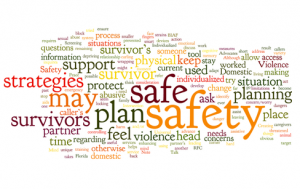Safety Planning
Safety planning is essential for anyone experiencing or fearing abuse, regardless of age or relationship. It helps prepare for potentially dangerous situations and ensures you have strategies in place for your safety.
Safety During an Explosive Incident
- Identify Safe Areas: Choose rooms with exits, away from weapons.
- Stay Near a Phone: Keep a phone accessible to call for help.
- Create a Support Network: Identify trusted friends, family, and community resources.
- Plan Your Exit: Know the safest routes out of your home.
- Prepare a Go-Bag: Pack essentials in a discreet spot.
- Establish a Code Word: Use a signal with trusted individuals for help.
- Involve a Neighbor: Ask them to call the police if they hear disturbances.
Safety When Preparing to Leave
- Establish Financial Independence: Open a personal bank account.
- Prepare Essential Items: Leave key items with a trusted person.
- Keep Emergency Contacts Handy: Have important numbers such as hotlines accessible.
- Identify Safe Places: Know where to go.
Safety After You Leave
- Change Your Contact Information: Update your phone number, email, social media, etc.
- Secure Your Living Environment: Change locks and consider security measures.
- Create a Support Network: Stay connected with friends and support groups.
- Consider Legal Protections: Look into restraining orders.
Safety With Co-Parenting
- Establish Clear Communication: Use neutral methods for contact such as court ordered parenting apps or a third party.
- Set Boundaries: Clearly define parenting responsibilities.
- Use Safe Locations for Exchanges: Choose public places for child exchange, supervised exchange locations, or involve a third party.
- Create a Parenting Schedule: Develop a detailed parenting plan outlining custody arrangements.
- Document Everything: Keep thorough records of all communication as well as any incidents or breaches of boundaries.
- Keep Your Child Informed: Explain necessary boundaries to your child with age-appropriate conversations.
- Coordinate with the School: Inform school about your situation and discuss safety measures.
- Monitor Your Child’s Well-Being: Be attentive to any changes in your child’s behavior or feelings.
Safety for Teens Experiencing Dating Violence
- Recognize Warning Signs: Be aware of controlling behaviors.
- Talk to Trusted Adults: Seek help from family, teachers, or counselors.
- Create a Support Network: Share your situation with supportive friends.
Remember, your safety is the priority. Regularly review and adjust your safety plan to ensure it meets your current needs.
If you would like assistance with developing your safety plan, please call our 24-Hour Crisis Line.
All Services are Free & Confidential
- Local Number: 608-791-2600
- Toll-Free Number: 1-888-231-0066
- Text Only Number: 608-667-9944


